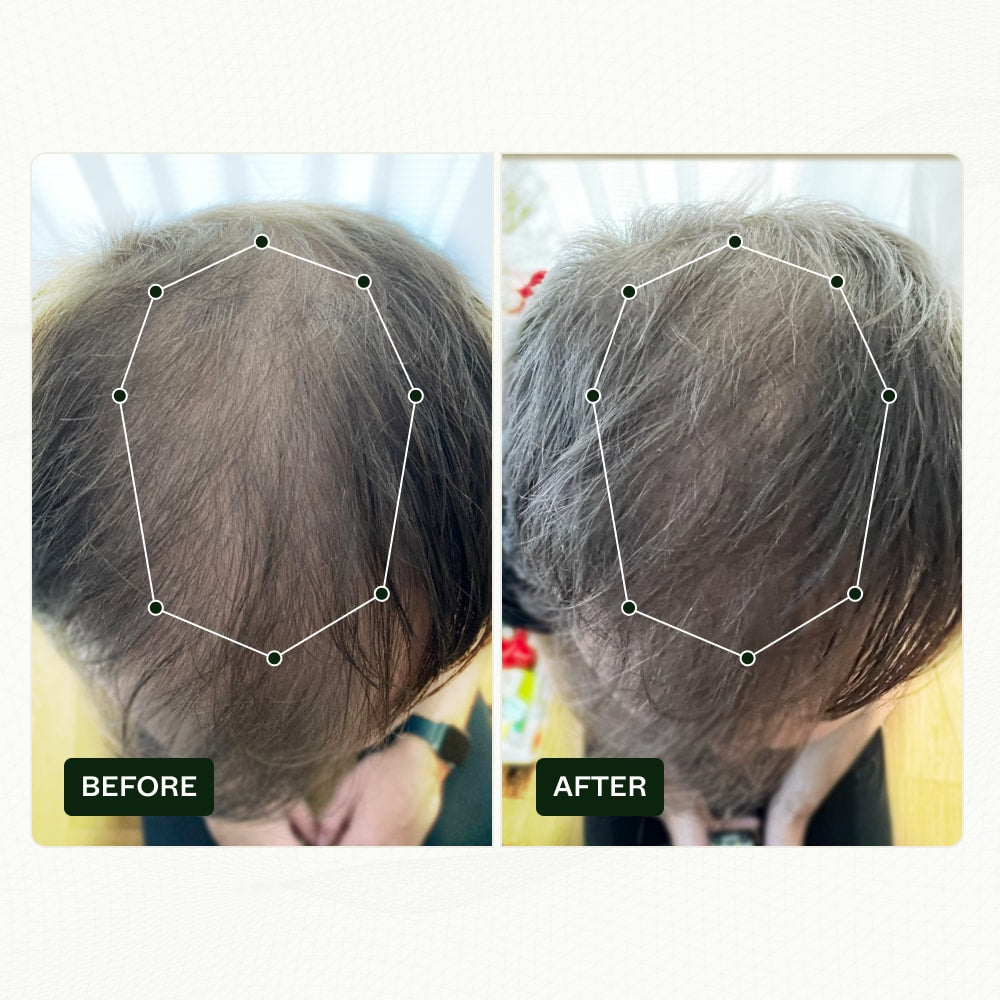DHT blocker shampoo side effects are a crucial consideration for anyone looking to combat hair loss.
While these shampoos are designed to help prevent hair thinning and promote hair growth by blocking dihydrotestosterone (DHT), it's essential to understand the potential downsides.
In this article, we'll delve into the common side effects of DHT blocker shampoos, helping you make an informed decision about their use in your hair care routine.
Table of content
How does blocking DHT stop hair loss?
Blocking DHT helps stop hair loss by preventing the hormone from binding to androgen receptors in hair follicles, which can cause them to shrink and eventually stop producing hair.
Dihydrotestosterone (DHT) is a male sex hormone essential for male sexual development but becomes less significant after adolescence. However, DHT can negatively impact healthy hair growth.
Excessive DHT in men is a primary cause of male pattern hair loss, or androgenetic alopecia. This hormone binds to androgen receptors in hair follicles around the hairline, crown, and mid-scalp, leading to follicle miniaturization.
This process results in damaged follicles that no longer produce hair, manifesting as receding hairlines, bald spots, or diffuse thinning, particularly in women.
By using DHT blockers, the body converts less testosterone to DHT, reducing its presence and its ability to bind to hair follicle receptors.
Consequently, this helps prevent hair loss and promotes healthier hair growth, particularly in individuals whose follicles are sensitive to DHT.
As your leading source for hair health information over the past 4 years, we never compromise on accuracy. When it comes to your health, you deserve information you can truly rely on - and earning your trust is our top priority.
Here's how Scandinavian Biolabs ensures every piece of content meets the highest standards of accuracy and integrity:
- Credentialed Experts: Our reviewers are actively practicing doctors and medical researchers
- Stringent Reviews: Content undergoes rigorous editing by subject specialists and review by a practicing doctor.
- Evidence-Based: We rely on well-established research from trusted scientific sources like peer-reviewed journals and health authorities.
- Full Transparency: Our editorial standards, writer credentials, reviewer credentials, correction process, and funding are all publicly documented.
- Independent Voice: While we do promote products, we operate in a vacuum to business operations. Our main goal is just an unwavering commitment to providing medically-sound guidance.
You can count on Scandinavian Biolabs to consistently deliver the trustworthy health information you deserve. Read our Editorial Standards.
What is the ingredient in a DHT blocker shampoo that can cause side effects?
The active ingredient in your DHT shampoo can be the reason behind the side effects.
Ketoconazole
Ketoconazole, or ketoconazole shampoo, is a potent antifungal that targets scalp conditions and reduces DHT levels, potentially leading to irritation or allergic reactions in sensitive individuals.
Saw Palmetto
Derived from the fruit of the saw palmetto tree, this natural DHT blocker is believed to slow hair loss by blocking DHT. Its use can occasionally result in scalp itchiness or irritation.
Tea Tree Oil
Known for its antimicrobial and anti-inflammatory properties, tea tree oil is used to cleanse the scalp and prevent dandruff. However, this natural ingredient may cause allergic reactions or skin irritation in some people.
Pyrithione Zinc
This ingredient is effective against dandruff and seborrheic dermatitis. While beneficial for scalp health, it can sometimes lead to dryness or irritation of the scalp.
Salicylic Acid
Used to remove dead skin cells and excess sebum from the scalp, salicylic acid can promote a healthy hair growth environment. Nonetheless, it might cause skin dryness or irritation in higher concentrations.
Do DHT blocking shampoos have side effects?
DHT blocking shampoos are generally safe for most people, but some users may experience side effects such as itching, redness, a burning sensation on the scalp, dryness, and irritation. Scalp inflammation is also a possibility.
In rare cases, severe allergic reactions like anaphylaxis can occur, requiring urgent medical attention if you experience symptoms such as swelling in the mouth or throat or chest tightness.
Oral DHT blockers like Finasteride have more significant side effects due to their systemic nature, impacting the entire body. These side effects can be more severe compared to those from topical DHT blocking shampoos.
DHT blocker shampoo side effects include:
- Erectile dysfunction, a potential issue affecting sexual health
- Gynecomastia and other breast tissue problems, leading to unwanted changes
- Thicker, darker facial and body hair, resulting in unintended hair growth in other areas
- Fertility problems, possibly impacting reproductive health
- Anxiety and depression, leading to mental health concerns
- Nausea and vomiting, causing gastrointestinal discomfort
How to minimize DHT?
To minimize side effects, it's important to focus on factors that directly impact how these DHT shampoos interact with your scalp health and hair growth cycle.
Here are a few ways you can minimize DHT side effects:
1. Follow Application Guidelines Precisely
Adhere closely to the recommended amount and frequency of use provided by the anti DHT shampoo manufacturer. Using too much shampoo or applying it too frequently can exacerbate side effects.
2. Gradual Introduction to Your Routine
Introduce the DHT blocker shampoo into your hair care routine gradually, starting with fewer applications per week and slowly increasing as your scalp adjusts, to minimize potential irritation or adverse effects.
3. Rinse Thoroughly
Ensure you rinse your hair and scalp thoroughly after each use to remove all traces of the shampoo. Residual products can lead to scalp irritation or dryness.
4. Moisturize and Condition
Use a nourishing conditioner or a scalp moisturizer after shampooing, especially if you experience dryness or irritation from the DHT blocking shampoo. This can help restore moisture balance and soothe the scalp.
5. Monitor Scalp and Hair Health
Regularly assess your scalp for signs of irritation, such as redness, itching, or flaking, and monitor your hair for changes in texture or increased shedding. These observations can help you adjust your use of the product accordingly.
6. Patch Test for Sensitivity
Before fully integrating a DHT blocker shampoo into your regimen, perform a patch test by applying a small amount to a discreet area of your scalp. Wait 24 to 48 hours to observe any adverse reactions.
7. Limit Concurrent Hair Treatments
Avoid using other potentially irritating scalp or hair treatments in conjunction with a DHT blocker shampoo, such as chemical hair dyes, perms, or relaxers, to reduce the overall burden on your scalp.
Is there an effective alternative for hair growth?
An alternative without any harmful side effects and has a 93% clinical trial effectiveness.

Our Hair Growth Routine is a plant-powered solution against thinning hair and hair fall without the risk of life-changing side effects.
Why Us?
- Leave Your DHT Alone: Our ingredients are not known in current scientific research to block DHT.
- Zero Harmful Side Effects: Pure peace of mind.
- Nature-Powered: Vitamins and extracts to encourage natural hair regrowth.
- For All Hair Types: Universal love for every strand.
- Clinically Tested: 93% of trial participants see a decrease in their hair loss in 150 days.
Choose Confidence. Choose Health.
Switch to our Hair Growth Routine today. No risks, just robust hair regrowth to help you push back male pattern baldness and female pattern hair loss.
Ready to transform your hair loss?
What to do if you see side effects?
In case of severe side effects of DHT blockers, consult a doctor as soon as possible. Do not apply the DHT blocking shampoo again and wait for the doctor’s instruction to alleviate the side effects. They will also be able to give you alternative hair loss treatment options depending on your male or female hair loss.
References
- Dihydrotestosterone [Internet]. [cited 2021 Sep 19]. Available from: https://www.yourhormones.info/hormones/dihydrotestosterone/
- Burke D. Allergic Reaction: Symptoms, Treatment, Prevention & More [Internet]. 2021 [cited 2021 Sep 19]. Available from: https://www.healthline.com/health/allergies/allergic-reaction
- Green B. How Bad are Parabens for Your Hair? [Internet]. 2018 [cited 2021 Sep 19]. Available from: https://voiceofhair.com/how-bad-are-parabens-for-your-hair/







